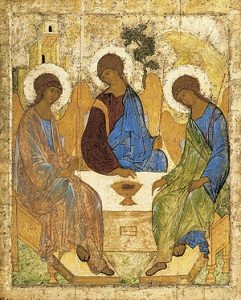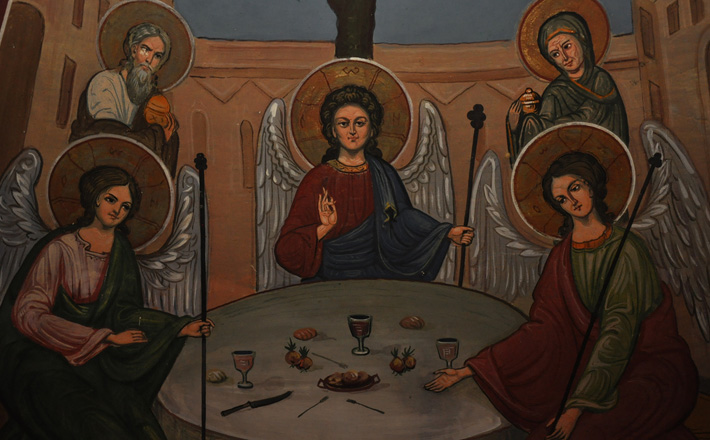Revised Common Lectionary Reflection, Trinity Sunday, Year C
June 16, 2019
Lessons: Proverbs 8:1-4, 22-31; Psalm 8; Romans 5:1-5; John 16:12-15
Theme: God’s faithful and generous people trust the relational character of the Triune God working in, with, through (and sometimes in spite) of us.
Key Scripture: …and hope does not disappoint us, because God’s love has been poured into our hearts through the Holy Spirit that has been given to us. – Romans 5:5
Preaching/Teaching Reflection
 Here we are again, dear preachers and teachers! Yes, it’s Holy Trinity Sunday, that oft-dreaded day of trying to explain an inexplicable concept about the nature of God. Oh sure, there will be attempts to “get at” the idea and make it clear as dreadful poetry: ice cubes, water, and vapor, a three-leaved clover, an apple with its seeds, flesh, and skin—you get the picture. So here’s my plea to you: don’t go this route! Don’t try to explain and rationalize a great and beautiful mystery. Stop trying to parse the divine and instead revel in the wonder and awe of the entirety of creator and creation.
Here we are again, dear preachers and teachers! Yes, it’s Holy Trinity Sunday, that oft-dreaded day of trying to explain an inexplicable concept about the nature of God. Oh sure, there will be attempts to “get at” the idea and make it clear as dreadful poetry: ice cubes, water, and vapor, a three-leaved clover, an apple with its seeds, flesh, and skin—you get the picture. So here’s my plea to you: don’t go this route! Don’t try to explain and rationalize a great and beautiful mystery. Stop trying to parse the divine and instead revel in the wonder and awe of the entirety of creator and creation.
Trinity Sunday is a day to celebrate the nature of the Triune God, not try to rationalize or theologize the Divine. Words fall short, no matter how brilliant, to capture the essence of the Holy Trinity. If God is best expressed as love and the Holy Trinity as relationship, then perhaps participation is the correct response and best approach for this day.
Paul’s words in the short lesson from Romans remind us that “God’s love has been poured into our hearts through the Holy Spirit that has been given to us” (5:5b). Yes! That Spirit has been poured into us, breathed into us through Christ’s peace, and is ever with us. It’s the gift that keeps on giving even though we may not realize we have it in us. The Holy Spirit activates our faith, the very stuff that makes real discipleship possible.
The late religious scholar and author Phyllis Tickle predicted that this 500 year cycle of the church’s life would ascribe its authority to the Holy Spirit. This is a move away from the last 500 year cycle that was initiated by the Reformation and that ascribed authority to scripture. In short, perhaps it’s time to move out of our heads and into our hearts. Rather than spending our time building convincing arguments, planning new initiatives and clever strategies, and spouting a river of prose and predictions, we might consider simply being God’s beloved people in relationship with God, one another, and all of creation.
What if we embraced mystery and celebrated the communion of every last molecule of creation in the divine dance of the Trinity? What if we admitted that we don’t have all the answers, that we’re a bit unsure of the way ahead, but that we’re open to whatever the Holy Spirit reveals (including thinking outside of the box AND outside of our buildings and traditions)?
 We are but a breath in the lifespan of the cosmos, our numbered days spinning in an ever expanding universe. Our lives are such precious and amazing gifts meant to be fully lived in praise of our Creator, in union with the Body of Christ, and in agape love with our neighbors. Why then are we so prone to squander, fret, and fill our days with so much of what has little lasting value? We humans tend to work ourselves to the bone. We amass possessions that quickly depreciate in value and meaning. We claw our way upward in standing and position without thought to the lives and needs of those around us. We lose so very much when we turn from the relational God who loves us so very much, and who is always there ready to enter into deeper communion, to infuse our lives with meaning and purpose.
We are but a breath in the lifespan of the cosmos, our numbered days spinning in an ever expanding universe. Our lives are such precious and amazing gifts meant to be fully lived in praise of our Creator, in union with the Body of Christ, and in agape love with our neighbors. Why then are we so prone to squander, fret, and fill our days with so much of what has little lasting value? We humans tend to work ourselves to the bone. We amass possessions that quickly depreciate in value and meaning. We claw our way upward in standing and position without thought to the lives and needs of those around us. We lose so very much when we turn from the relational God who loves us so very much, and who is always there ready to enter into deeper communion, to infuse our lives with meaning and purpose.
So yes, this Trinity Sunday let’s embrace the mystery of the amazing relational God we worship. Let’s challenge one another to a new way of being Christ’s Body in the world and of living like every second truly matters. Why? Because everything matters to God, and because hope will not disappoint us.
In Worship
As a general rule, sitting with mystery, wonder, and awe is not exactly second nature for 21st century Christians. This makes Trinity Sunday particularly daunting because we tend to feel the necessity to “human-splain” the ineffable nature of God using words and inept metaphors for that which resists explanation and responds best to experience and relationship.
This Sunday try making a few changes to the worship environment that will invite worshipers to experience the Trinity in ways they may not have considered:
- Use art that illustrates the Triune God in divine relationship. See the images in the lectionary reflection above for ideas. Let congregants talk in small groups or pairs about what they see and feel in response to these images.
- Work language into your liturgy for Holy Communion that reflects the image of gathering with God the Father, God the Son, and God the Spirit around the welcome table.
- Talk about the union of mind, heart, and breath—of being a whole creature rather than a fragmented self, relying on dualistic or singular imagery.
- Sing “Come, Join the Dance of Trinity” and consider (gasp!) dancing or moving to the music.
- Remind worshipers that they are recipients of the gift of the Holy Spirit in baptism, that God’s Spirit truly does abide with each one of us.
With Youth
Use Psalm 8 as the lesson for this week’s gathering. Show the documentary The Biggest Little Farm (available for purchase from Amazon), or at least show the trailer and explore the farm’s website here. This film tells the story of a young LA couple who decided to begin farming a forlorn piece of land in Southern California using the principles of biodynamic agriculture. Invite youth to consider the story of this farm in light of Psalm 8 and Trinity Sunday. How do the principles of biodynamic agriculture create a symbiotic relationship for the flourishing of all creation? What can we learn from this farm about the relational nature of God, the Holy Trinity, and the Body of Christ? How are we flourishing? In what ways and through what choices do we prevent flourishing?
With Children
This week’s focus verse is Proverbs 8:1 – “Does not wisdom call, and does not understanding raise her voice?”
 There’s a song from the classic Broadway musical Guys and Dolls called “Luck be a Lady.” Sky Masterson sings the song, referring to his need to win a bet in order to win the woman of his dreams. It’s a nice musical and a fun song, but today we have a different description from the book of Proverbs.
There’s a song from the classic Broadway musical Guys and Dolls called “Luck be a Lady.” Sky Masterson sings the song, referring to his need to win a bet in order to win the woman of his dreams. It’s a nice musical and a fun song, but today we have a different description from the book of Proverbs.
Here we might revise the lyrics to say “Wisdom be a Woman.” The psalm writer describes wisdom as a woman who is very wise, who has been with God since creation, who knows God intimately and in whom God takes delight. This wise woman constantly rejoices before God and rejoices in creation and humankind. She is a wise woman indeed, and we can learn from her.
Who are the wise women that you know? Entertain all answers—mother, grandmother, pastor, teacher, Wonder Woman, friend. Remind the children and the congregants that wisdom is an attribute of the Holy Spirit and a gift from God. We can all aspire to be wise people by following God and paying attention. Finish with a simple prayer.
Weekly Stewardship Bulletin Insert
The importance of the stewardship of relationships is clear in the lessons for Trinity Sunday. We are in relationship with a relational God, and when we nurture that relationship we will flourish.
Stewardship at Home
This week we focus on the idea of God as relational through the image of the Holy Trinity. We are created to be in relationship with God and with one another. Put special emphasis on the stewardship of relationships this week. Print a copy of Rublev’s Icon of the Holy Trinity (or similar art), and use it as a focal point for your daily devotions/spiritual practices.
Pay attention to the natural world and how relationships abound in nature. Go see the documentary The Biggest Little Farm if it is showing in your area. This film about a biodynamic farm in California illustrates the critical nature of symbiotic relationships in nature and how working with, as opposed to over and against, nature helps the farm to flourish. Click here to visit the website and watch a trailer.
2016 Reflection: https://www.stewardshipoflife.org/2016/05/in-this-we-boast-in-christ-we-hope/
2013 Reflection: https://www.stewardshipoflife.org/2013/05/in-good-company-peace-love-hope/
2010 Reflection: https://www.stewardshipoflife.org/2010/05/the-divine-ensemble/
Photos: Fergal Mac Eoinin (“The Holy Trinity” Neppendorf, Sibiu, Romania), Icon of the Holy Trinity, Andrei Rublev, and Art in the Christian Tradition (Snowstorm of Stars and Wisdom Mural, Library of Congress), Creative Commons usage license. Thanks!
Note: Reprint rights granted to congregations and other church organizations for local, nonprofit use. Just include this note: “Copyright (c) 2019, Rev. Sharron Blezard. Used by Permission.” Other uses, please inquire: thewritelife@hotmail.com.




Leave a Reply